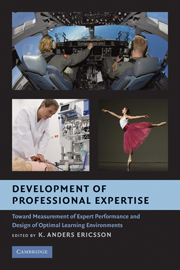 Development of Professional Expertise
Development of Professional Expertise Published online by Cambridge University Press: 04 August 2010
The daily train trip between my small hometown and the university city where I used to work has always provided me with lots of unexpected opportunities to receive feedback about students' perceptions of their education. In all those years I have overheard them talking about their studies, teachers, lectures, peers, but also about parties and village gossip. One conversation among three students of a beauty course in one of the community colleges struck me because of the sensible things they were saying about their curriculum. One of the girls was trying to read a chapter in a book about health for their assignment of that week. The book was meant for care and wellness courses, which was their course, taught by a young physician who – as they grumbled – “was not even handsome.” Apart from the appearance of their teacher, which might have been some compensation, their main complaint was that they did not have a clue about the use of this kind of knowledge for their future practice as beauticians.
The girls' complaint is very similar to the situation students in discipline-organized and teacher-centered academic curricula find themselves in. These kinds of curricula have many problems; among them are lack of horizontal and vertical integration of the subjects taught, an absence of apparent practical relevance to the students' perception of their future profession, a constant overload with too many courses, and an emphasis on the principles and practices of the separate academic disciplines instead of the practices of their future profession.
To save this book to your Kindle, first ensure [email protected] is added to your Approved Personal Document E-mail List under your Personal Document Settings on the Manage Your Content and Devices page of your Amazon account. Then enter the ‘name’ part of your Kindle email address below. Find out more about saving to your Kindle.
Note you can select to save to either the @free.kindle.com or @kindle.com variations. ‘@free.kindle.com’ emails are free but can only be saved to your device when it is connected to wi-fi. ‘@kindle.com’ emails can be delivered even when you are not connected to wi-fi, but note that service fees apply.
Find out more about the Kindle Personal Document Service.
To save content items to your account, please confirm that you agree to abide by our usage policies. If this is the first time you use this feature, you will be asked to authorise Cambridge Core to connect with your account. Find out more about saving content to Dropbox.
To save content items to your account, please confirm that you agree to abide by our usage policies. If this is the first time you use this feature, you will be asked to authorise Cambridge Core to connect with your account. Find out more about saving content to Google Drive.